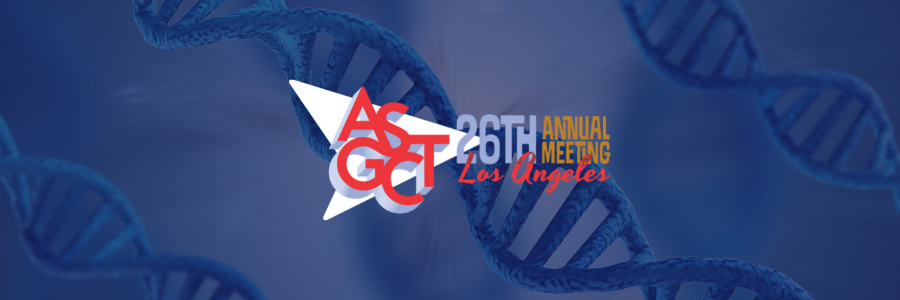Immune Responses, Genome Editing, Vector Design, and More at the 26th Annual Meeting
Attend May 16–20 - January 26, 2023
Get a sneak peek of four scientific symposia from ASGCT's 26th Annual Meeting in Los Angeles (May 16–20). Interested in learning from these experts? Register with early-bird pricing today!

ASGCT’s Annual Meeting is the premier event for professionals in gene and cell therapy. More than 6,000 attendees are expected to join us for and expanded four full days of science and sun in Los Angeles, CA, between May 16–20, 2023. We hope you can join us too!
The Society often gets questions on what opportunities the Annual Meeting provides. Here are some symposia we’re looking forward to. Meet the expert speakers handpicked by our member-volunteer scientific committees.
Like these workshops? Annual Meeting registration is now open!
Predicting and Overcoming Immune Responses in Gene and Cell Therapies
Sponsored by the Immune Responses committee
May 17, 8–9:45 a.m.
As the toolbox and clinical applications of gene and cell therapies expand, it is increasingly critical for the field to understand, predict, and prevent potential immune recognition of the therapeutic vector, transgene, or cell product. In this session, we will overview recent advances in our understanding of vector/transgene-related immune responses and toxicity in clinically relevant target tissues such as the eye or the brain and discuss assays that have been developed to uncover and overcome mechanisms and consequences of immune recognition of cell and gene therapy products.
Co-Chairs: Abraham Scaria, PhD, & Matthew R. Gardner, PhD
Kathryn L. Pepple, MD, PhD, will deliver “Predicting Immune Responses and Toxicity in Ocular Gene Transfer”
Isabelle Aubert, PhD, will deliver “Immune Responses in Immune Privileged Compartments (CNS)”
Andrea Annoni, PhD, will deliver “Assessing Transgene Immunogenicity in the Context of (LV) Gene Therapies”
Roland W Herzog, PhD, will deliver “Innate Immunity to AAV”
Expanding the Genome Editor Toolbox and Translation Towards the Clinic
Sponsored by the Genome Editing Committee
May 18, 8–9:45 a.m.
Genome editing technologies have reshaped our ability to modify genomes, bringing the promise of new therapies for human diseases within reach. In this symposium, speakers will highlight recent technological advances in the toolbox of CRISPR and non-CRISPR enzymes capable of making small and large genetic edits. These diverse platforms are being optimized in the pursuit of building highly precise genome editors with low genotoxicity. Our speakers will also discuss how these technologies will, and already are, having an impact in the clinic.
Co-Chairs: Benjamin P. Kleinstiver, PhD, & Mark Osborn, PhD
Andrew Anzalone, MD, PhD, will deliver “Prime Editing”
Alexis Komor, PhD, will deliver “Base Editing”
Cecilia Cotta-Ramusino, PhD, will deliver “Large Sequence Editors”
Fyodor Urnov, PhD, will deliver “From N=1 to N=All: Expanding the Clinical Impact of CRISPR”
From the Needle to the Nucleus: Exploring Key Points of Vector Design & Development
Sponsored by the Viral Vectors Committee
May 19, 10:15 a.m.–12 p.m.
This session will explore several key aspects of the development of gene therapy products, including developing the viral vector, the connection between vector design and manufacturing, tracking in vivo dynamics, and product durability. These topics will provide further insight into the nonclinical development and clinical translation of future viral-based gene therapy programs.
Co-Chairs: Mollie E. Jacobs, PhD, & Adam Cockrell, PhD
Katherine Ferrara, PhD, will deliver “AAV in vivo Tracking and Microscopy”
Constance Cepko, PhD, will deliver “In vitro AAV Genome Tracking and Microscopy”
Jagesh Shah, PhD, will deliver “In vivo Delivery with LVs to Therapy-relevant Cells”
Min Jee Jang, PhD, will deliver “Spatial Transcriptomics for AAV at Throughput”
Emerging Opportunities in Cellular Therapies Derived from Stem Cells
Sponsored by the Stem Cell Committee
May 20, 10:15 a.m.–12 p.m.
Stem cells have the unique ability to both self-renew and differentiate into defined cell lineages. New stem cell-based therapies are now being translated into clinical trials for diverse diseases. In this session, we will cover diverse programs developed from stem cells including the production of hematopoietic stem cells, immune cells, neural progenitors, and pancreatic islet cells.
Co-Chairs: Agnieszka Czechowicz, MD, PhD, & Dan Kaufman, MD, PhD
Elizabeth Ng, PhD, will deliver “iPSC to HSC”
Gay Crooks, MD, will deliver “Engineering iPSCs to generate therapeutic T cells”
Clive Svendsen, PhD, will deliver “Transplantation of Human Neural Progenitor Cells Secreting GDNF into the Spinal Cord of Patients with ALS: a Phase 1/2a Trial”
Alice Huang, PhD, will deliver “Basic and Translational Stem Cells to Tendons”
We hope you will join us!
Annual Meeting registration is open. Register by February 28 to receive early-bird pricing with $100 value!
Related Articles